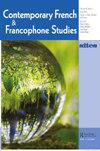(Re)Interpreting Normativity and Masculinity in Bahaa Trabelsi’s Une vie à trois
IF 0.2
4区 文学
0 LITERATURE, ROMANCE
引用次数: 0
Abstract
Abstract This article examines the multifaceted process of queer subjectivity (re)formation that queer Maghrebi subjects undergo as they (re)interpret their relationship to and orientation toward social norms, masculinity, and the spaces of exchange they inhabit. Bahaa Trabelsi’s Une vie à trois [A Life of Three] (2000) assembles an intricate literary text to signal the inequalities many non-normative or queer Maghrebi subjects encounter via conservative discourse. This article understands Trabelsi’s work as a critique of masculinity and society, in which she does reconfigure masculinity to develop a plural form, which is to say, “masculinities,” to go beyond singular, essentialized interpretations of the concept. To engage with Trabelsi’s apparent critique of Moroccan society, this article postulates that the several narratives in the novel assemble figures of revolt, which involve subjects purposefully eliding societal pressures, therefore, situating themselves as “others” within their communities to maintain agency and individual subjecthood.(重新)解读巴哈·特拉贝尔西的《三人行》中的规范性和阳刚性
摘要本文探讨了酷儿主体性(重构)形成的多面性过程,这是酷儿马格里布主体(重新)解释他们与社会规范、男性气质和他们所居住的交换空间的关系和取向时所经历的过程。巴哈·特拉贝尔西的《三个人的生活》(2000)汇集了一个复杂的文学文本,以表明许多非规范或酷儿的马格里布主题通过保守话语遇到的不平等。本文将特拉贝尔西的作品理解为对男子气概和社会的批判,她确实将男子气概重新配置为一种复数形式,也就是说,“男子气概”,超越了对这个概念的单一、本质化的解释。为了配合特拉贝尔西对摩洛哥社会的明显批判,本文假设小说中的几个叙事集合了反叛人物,其中涉及主体故意忽略社会压力,因此,将自己定位为社区中的“他者”,以保持代理和个人主体性。关键词:男性气质、规范性、空间性、跨国主义、马格里布注1所有的翻译都是我的,除非另有说明世界上其他酷儿之都还包括旧金山、特拉维夫和曼谷。酷儿之都指的是那些因大量涌入酷儿游客或居民而闻名的目的地L ' hsamxagone[六边形]是法国大陆的常用代表物,因为这个国家在地图上所描绘的形状这部小说根据在给定时间叙述故事的人分为几个部分根据国际HIV感染药物治疗大会(HIV Glasgow)上的一项研究,至少有38%的携带HIV的同性恋和双性恋移民在移居法国后感染了这种疾病。6我强调了“ma”[my]在叙事中作为主题的建构中的重要性。作者简介:donald Joseph是匹兹堡大学法语专业的博士候选人。他研究20世纪和21世纪的中东和马格里布文学,以及法语、阿拉伯语、加泰罗尼亚语和西班牙语的文化作品,研究方法涉及移民研究、男性气质研究和酷儿理论。他已在《当代法语与法语研究》、爱丁堡大学出版社和《作曲研究》上发表或即将发表论文。
本文章由计算机程序翻译,如有差异,请以英文原文为准。
求助全文
约1分钟内获得全文
求助全文
来源期刊

Contemporary French and Francophone Studies
LITERATURE, ROMANCE-
CiteScore
0.30
自引率
0.00%
发文量
43
期刊介绍:
An established journal of reference inviting all critical approaches on the latest debates and issues in the field, Contemporary French & Francophone Studies (formerly known as SITES) provides a forum not only for academics, but for novelists, poets, artists, journalists, and filmmakers as well. In addition to its focus on French and Francophone studies, one of the journal"s primary objectives is to reflect the interdisciplinary direction taken by the field and by the humanities and the arts in general. CF&FS is published five times per year, with four issues devoted to particular themes, and a fifth issue, “The Open Issue” welcoming non-thematic contributions.
 求助内容:
求助内容: 应助结果提醒方式:
应助结果提醒方式:


